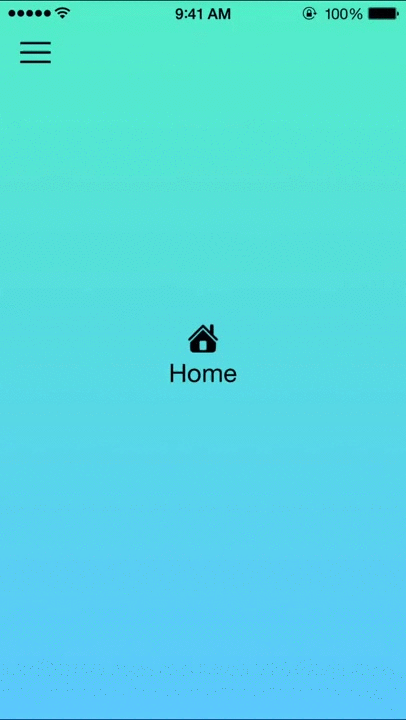This is a simple menu controller where I tried to simulate the native iOS animation of switching between apps. It can be used in many different ways and you can also customize it to use your own animations.
Developed and tested using iOS11+
JVMenuPopover is available through CocoaPods. To install it, simply add the following line to your Podfile:
pod "JVMenuPopover"
To run the example project, clone the repo, and run pod install from the Example directory first.
Using JVMenuPopover with your own project.
-
In your function
application: didFinishLaunchingWithOptions:we need to setup ourUIWindow,JVMenuNavigationControllerand your root view controller. Feel free to follow my project sample implementation where I use lazy intialization for these objects.- Also, it's important to set a background image to our
UIWindowto be able to achieve the our menu effect with a background image.
- Also, it's important to set a background image to our
- (BOOL)application:(UIApplication *)application didFinishLaunchingWithOptions:(NSDictionary *)launchOptions
{
// setting up app window
[self setupCustomWindow];
return YES;
}
#pragma mark - Custom Accessors
- (JVMenuRootViewController *)rootViewController
{
if (!_rootViewController)
{
_rootViewController = [[JVMenuRootViewController alloc] init];
}
return _rootViewController;
}
- (JVMenuNavigationController *)navigationController
{
if (!_navigationController)
{
_navigationController = [[JVMenuNavigationController alloc] initWithRootViewController:self.rootViewController transparentNavBar:YES];
}
return _navigationController;
}
#pragma mark - UIWindow Customization
- (void)setupCustomWindow
{
self.window = [[UIWindow alloc] init];
self.window.rootViewController = self.navigationController;
self.window.backgroundColor = [UIColor colorWithPatternImage:[[UIImage imageNamed:@"app_bg1.jpg"] imageScaledToWidth:self.window.frame.size.width]];
[self.window makeKeyAndVisible];
[self.window addSubview:self.navigationController.view];
}- Then, in your rootController we need to set our data model for our menu using the class
JVMenuItemswhich holds all the menu images, titles and the close button image to display. Also, we can set our preferred menu animation. And we need to create theJVMenuPopoverViewwhich is the actual menu with the menu items. Note: The same approach here the use of lazy intialization.
- (JVMenuItems *)menuItems
{
if(!_menuItems)
{
_menuItems = [[JVMenuItems alloc] initWithMenuImages:@[[UIImage imageNamed:@"home-48"],
[UIImage imageNamed:@"about-48"],
[UIImage imageNamed:@"settings-48"],
[UIImage imageNamed:@"business_contact-48"],
[UIImage imageNamed:@"ask_question-48"]]
menuTitles:@[@"Home",
@"About Us",
@"Our Service",
@"Contact Us",
@"Help?"]
menuCloseButtonImage:[UIImage imageNamed:@"cancel_filled-50"]];
_menuItems.menuSlideInAnimation = YES;
}
return _menuItems;
}
- (JVMenuPopoverView *)menuPopover
{
if(!_menuPopover)
{
_menuPopover = [[JVMenuPopoverView alloc] initWithFrame:self.view.frame menuItems:self.menuItems];
_menuPopover.backgroundColor = [[UIColor blackColor] colorWithAlphaComponent:0.5];
_menuPopover.delegate = self;
}
return _menuPopover;
}- Then, we need to set our menu bar button with our preferred image and set the target to show the menu.
- (void)viewDidLoad
{
[super viewDidLoad];
// creating menu
self.menuPopover = [self menuPopover];
// setting up menu bar button
self.navigationItem.leftBarButtonItem = [[UIBarButtonItem alloc] initWithImage:[UIImage imageNamed:@"menu_black-48"] style:UIBarButtonItemStylePlain target:self action:@selector(showMenu)];
self.navigationItem.leftBarButtonItem.tintColor = [UIColor blackColor];
}- Finally, we set our menu bar button to target to call the
JVMenuPopoverViewhelper function and our menu delegate to know which menu item was selected by the user and present a new view controller or whatever you would like to then. Note: after iOS 9, we can't no longer present self on our rootController so, you might need to either have a property for the rootController and use that instead.
#pragma mark - Menu Helper Functions
- (void)showMenu
{
[self.menuPopover showMenuWithController:self];
}
#pragma mark - Menu Delegate
- (void)menuPopoverDidSelectViewControllerAtIndexPath:(NSIndexPath *)indexPath
{
if(indexPath.row == 0)
{
[self.navigationController setViewControllers:@[self.rootController]; // this is a temporary fix for the issue on iOS 9 not able to set 'self' as the current view controller
}
else if(indexPath.row == 1)
{
[self.navigationController setViewControllers:@[self.secondController]];
}
}Contact me if you find any bugs or potential room for improvements, which I am sure there are. Jorge Valbuena (@JV17), [email protected]. BTW! You are welcome to help in supporting this pod or making improvements to it.
JVMenuPopover is available under the MIT license. See the LICENSE file for more info.
- Improved landscape support. Now the menu closes prior rotation to avoid image size issues.
- Added new delegates to Menu view to know when the menu view will show or hide.
- Added new property to the Menu view which indicates if the view hidden or not.
- Added optional functions on the rootController which hides & shows the navigationItem button (menu button), please sample project for this.
- Added landscape support. Please be advise that you might need to provide a bigger image allow the background to show properly.




